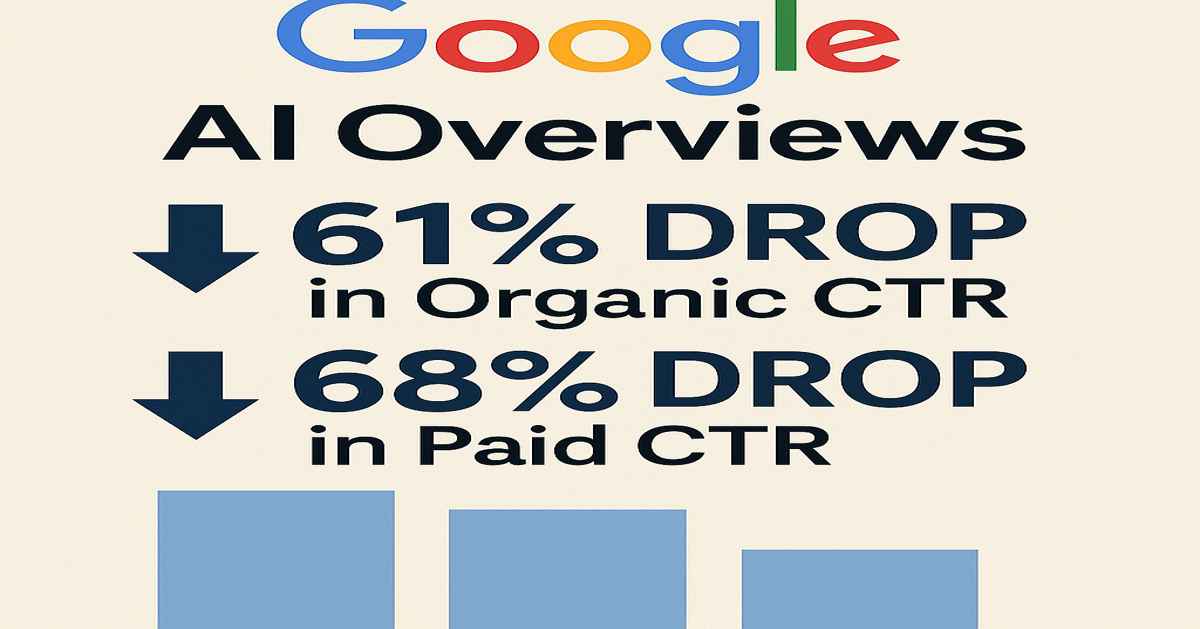Introduction
Have you observed distant clicks coming from Google ever so often, despite your pages sitting on good rankings? You’re not the only one.
With the rise of Google AI Overviews, a recent study indicates a 61% drop in organic click-through rates and a 68% dip in paid CTR-gravediggers for sites that live and die depending on SEO and ads.
So what really is happening? Why are clicks just dropping? And, most importantly, what’d businesses do to stay ahead of this shift once it gnaws at their revenue and visibility?
Let’s break it down and speak human.
What’s Causing the Dramatic Drop in CTR?
The AI Overviews, appearing at the very top of the search, would scribble some kind of automatic answer, more often from information stitched together from at least a few websites.
Therefore, lots of users get their answers right there-and-then and don’t bother scrolling down to the organic and paid listings anymore.
The trend falls under what are called zero-click searches, where users get their value without needing to leave Google’s ecosystem.
Secondary keywords used here: zero-click searches, AI search results
How Does This Affect Organic and Paid Traffic?
Earlier ranking high mostly meant being in positions 2 or 3. Now, even #1 might be below the AI Overview box.
Paid ads would be atop the fold some years ago, but as of late, these would be moved down after AI summaries, giving them lesser exposure and CTR.
This is not just a ranking problem but visibility and position as per the new layout.
As shared by a digital strategist:
“It’s not just about being first on Google anymore. It’s about being visible where the user’s eyes actually land.”
Secondary keywords used: SERP click-through rate, paid search ads performance
Are AI Overviews Always Accurate or Helpful?
And this is where it gets interesting.
AI Overviews try to be helpful but sometimes:
– Miss previous context
– Provide oversimplified answers
– Rely on limited or generalized sources
And yes, there have been some publicly documented issues with AI Overviews giving an incorrect or advise that was actually misleading.
So while users enjoy convenience, trust is still being established.
In case you want a more exhaustive explanation of how AI Overviews actually work, feel free to consult this internal guide:
How Should Website Owners and Marketers Respond?
Rather than fighting AI Overviews, we now want to optimize for them.
The following set of things will help:
Answer with concise and well-structured explanations
Keep paragraphs brief and employ bullet points to increase the likelihood of your page being quoted.
Use schema markup
Schema helps the search engines to gain a better understanding of page meaning and increases its chances of selection for overview summaries. (We said everything about this in detail here):
Target keywords with strong search intent, not volume
Re-check paid campaign bidding strategies
Create content that pulls the rope deeper than quick answers.
Secondary keywords for relevance: SEO strategy 2025, content depth optimization.
What Does This Mean for the Future of Search Marketing?
The transition in search goes from “links and lists” into “context and answers.”
This means:
Users will spend more time on Google
Content must be worthy of trust and high value
Authority and brand identity have far more weight these days than keyword stuffing
As one industry expert put it:
“AI won’t replace SEO, but SEO without adaptation will fade.”
External Resources (Useful, but Not Reference)
To understand the official Google explanation of AI Overviews and ranking context, one should read Google’s own documentation:
FAQs
1. Are AI Overviews replacing SEO?
No, but they are affecting how one has to execute SEO strategies. SEO isn’t dead; rather, it is evolving.
2. Will rankings matter if CTR drops?
Yes, visibility matters even when something is more often clicked less. Being referenced in AI Overviews also sends signals of trust.
3. How does one get content featured in AI Overviews?
Implement structured data and answer-first formatting; run your content through tests of accuracy and authority.
4. Should I decrease my Google Ads budget because paid CTR is dropping?
Not necessarily. Reconsider keyword targeting, bidding strategies, and the relevance of your landing pages instead.
5. Is this a permanent change?
AI in search seems to be here to stay; however, the way it appears will continue to change. Being an early adopter therefore grants you competitive advantage.
Conclusion
Such a drop in CTR might sound scary, but it is actually a big clue: search behavior is changing.
Businesses rise above the noise only when they adapt early by focusing on clarity of content, building authorities, and giving structure to information.
If you found this characterization helpful, share your thoughts and questions. Let us discuss how your site can take the lead in this shift.
